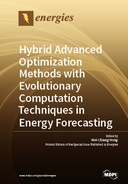Explore

Hybrid Advanced Optimization Methods with Evolutionary Computation Techniques in Energy Forecasting
0 Ungluers have
Faved this Work
Login to Fave
More accurate and precise energy demand forecasts are required when energy decisions are made in a competitive environment. Particularly in the Big Data era, forecasting models are always based on a complex function combination, and energy data are always complicated. Examples include seasonality, cyclicity, fluctuation, dynamic nonlinearity, and so on. These forecasting models have resulted in an over-reliance on the use of informal judgment and higher expenses when lacking the ability to determine data characteristics and patterns. The hybridization of optimization methods and superior evolutionary algorithms can provide important improvements via good parameter determinations in the optimization process, which is of great assistance to actions taken by energy decision-makers.This book aimed to attract researchers with an interest in the research areas described above. Specifically, it sought contributions to the development of any hybrid optimization methods (e.g., quadratic programming techniques, chaotic mapping, fuzzy inference theory, quantum computing, etc.) with advanced algorithms (e.g., genetic algorithms, ant colony optimization, particle swarm optimization algorithm, etc.) that have superior capabilities over the traditional optimization approaches to overcome some embedded drawbacks, and the application of these advanced hybrid approaches to significantly improve forecasting accuracy.
This book is included in DOAB.
Why read this book? Have your say.
You must be logged in to comment.
Rights Information
Are you the author or publisher of this work? If so, you can claim it as yours by registering as an Unglue.it rights holder.Downloads
This work has been downloaded 152 times via unglue.it ebook links.
- 93 - pdf (CC BY-NC-ND) at Unglue.it.
Keywords
- chaotic mapping mechanism
- empirical mode decomposition
- energy forecasting
- evolutionary algorithms
- general regression neural network
- hybrid models
- optimization methodologies
- quantum computing mechanism
- recurrence plot theory
- support vector regression/support vector machines
Links
DOI: 10.3390/books978-3-03897-287-7Editions


